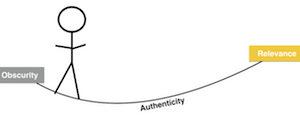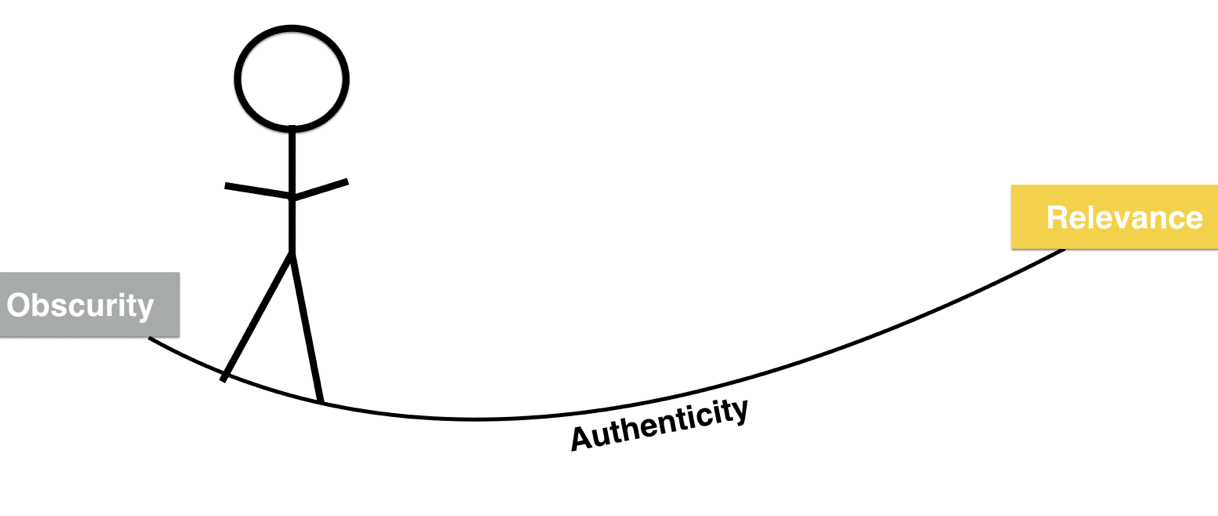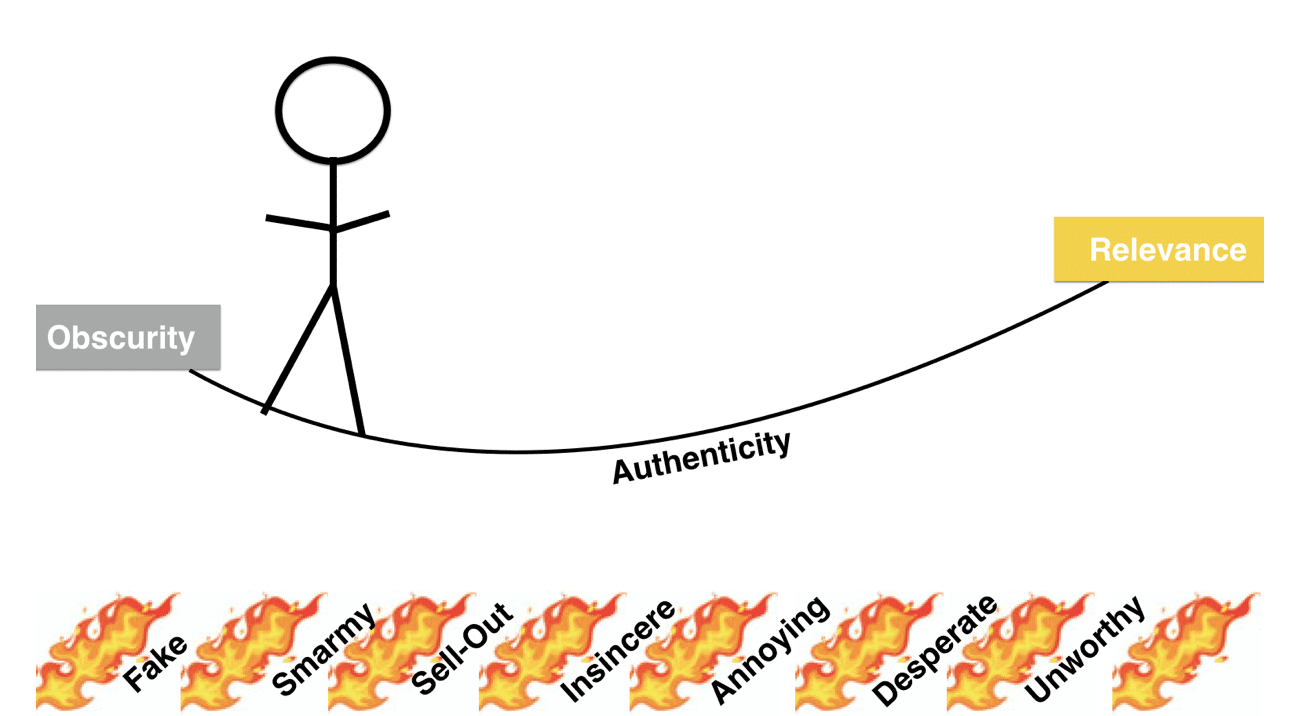
Just be yourself.
Don’t pretend to be something you’re not.
Be genuine.
Try to be more authentic.
But, really folks. What does authenticity really mean? Am I the only one who struggles with this question?
Am I the only one who has a small authenticity crisis whenever someone tells me to ‘just be myself?’
I am having a blogger identity crisis. Every time I sit down to write something for the Science of People, I fight two opposing forces. Good and Evil.
Good: Create content that people LOVE.
Evil: Write click-baity headlines that leave me feeling dirty.
Good: Make it easy for your readers, be on every platform.
Evil: Be a social media whore—use every network that was ever created.
Good: Be relentlessly helpful.
Evil: Avoid Internet silence at all costs—post constantly, all the time.
Good: Be authentic.
Evil: Be popular.
I constantly face the challenge of trying to put out amazing content in a non-annoying way, while also trying to build a successful business and meet everyone’s needs. This same challenge happens in person when you show up at an event trying to be genuine, but also wanting to drum up business. Is it possible to…
- Give an elevator pitch without pitching?
- Sell without feeling like a salesman?
- Talk about yourself without sounding self-centered?
This was the biggest question I faced when writing my book Captivate. When I sat down in the Fall of 2015 to draft the book, I struggled with all of these questions and more. Then I realized this wasn’t just about the book:
In the world of online dating, LinkedIn super-networks and fierce job market competition, we constantly are walking the tightrope of authenticity, while trying to avoid falling into the abyss of obscurity.
Every business book, social media conference and Internet expert is telling you to sell, sell, sell—but in an authentic way. We are playing a balancing act between being relevant and accessible versus obsequious and annoying.
I call this the Authenticity Crisis.

We hate obscurity:
- Not getting enough likes.
- People not remembering our name after having met.
- Not getting enough subscribers.
- People not wanting to know us at a party.
- People not wanting to work with us.
- Not getting the job.
- Not getting enough book sales.
And we desperately crave being relevant:
- Liked by our followers.
- Appealing to potential clients.
- Relevant to potential readers.
- Attractive to potential daters.
- Impressive to our bosses.
- Desired by our spouses.
But at any moment, if we are not authentic enough, we risk falling into the fiery flames of inauthenticity hell.

Before we post we ask ourselves an endless number of questions:
- Is it good enough? Is it interesting? Will people like this?
OR
- Is this too much? Is this a humble brag? Should I tone it down? Am I posting too much?
When we go to an event we worry:
- Am I impressive enough? How can I win friends and influence people? Will people like me?
OR
- Did I talk too much? Did I talk too little? Did I sound braggy?
On a date or during a meeting we fret:
- Will they see me as a good match? What do they want to hear? How can I show off without being a show-off?
OR
- Do they think I am self-centered? Did I showcase my best self? What do they think of me?
This is what it’s like walking the authenticity tight rope. And it sucks.
So, here I was, writing a book for a major publisher, grappling with this authenticity crisis. How could I write about myself and my work and not talk about myself too much? How could I stay relevant while still making it all about the reader? I came up with three guiding principles as I was writing.
How to Be Yourself
These grounded me and began shaping my writing and my in-person interactions. And I hope they can help you, too.
Assume Intimacy
You often hear people say, “Assume the best in people.” I actually have a slightly different mantra:
Assume intimacy with people before you have it.
Why? Walking the authenticity tightrope is really about leveling up your relationships. You want to make strangers into clients, matches into dates or acquaintances into friends. And you do this by trying to prove yourself, by being yourself. This is really hard and was the biggest worry I had while writing my book. My biggest writer’s block at the beginning was this:
Most of the people who pick up this book will be strangers to me. So, how do I enlighten, impress and write for strangers?
This tripped me up and made my first stabs at writing cold. And, to be frank, I was trying way too hard. Consider my original first line of the entire book:
In this book, you will discover the hidden forces that drive human behavior to become more likable, influential and successful.
Boring. Trying too hard. Meh. I was writing as if I was speaking to a stranger. Therefore, I felt like a stranger to them. After weeks (yes weeks) of agonizing about the first line, my husband had me play an imagination game.
Imagine you are opening up an email to a new friend. You want to tell them about you because you know you will be real friends with them soon. What would you say?
In other words, he wanted me to level-up early. I wanted to be friends with my readers. (After all, every chapter is me sharing my favorite human behavior hacks, personal anecdotes and struggles.) All I had to do was speed up the process. I literally opened up an email and wrote:
Hi, my name is Vanessa, and I’m a recovering awkward person.
This line got my writing flowing. I began writing each chapter as if I was writing emails to a friend. This was a way I could ‘just be myself’ and keep it real. And guess what? This ended up being the actual first line of the book!
Takeaway: Assume intimacy from the beginning. Talk to strangers like you would talk to a real friend. Don’t treat a first date like a job interview, imagine it is a 3rd date instead. And see your job interviewer as an existing colleague instead of an intimidating new boss.
The Opposite of Obscurity Is Not Fame
Really early on in the book writing process, my editor, Niki Papadapolous, encouraged me to NOT write a book for everyone. When you try to appeal to everyone, she explained, your writing and your tips tend to get watered down—actually being relevant to no one.
Bottom Line: Relevancy is not a numbers game.
I would rather be extremely, personally, intimately relevant to 1,000 people than kinda, sorta, maybe relevant to 100,000. Who did I want to be my ideal reader-friend?
- Above-average intelligence
- Highly book smart or an off-the-charts creative
- Loves science, numbers and data
- An ambivert
- Loves animals (This is absolutely irrelevant to the book, but was an essential part of the ideal reader I had in mind.)
You would think that narrowing our scope down and focusing on a niche would be limiting, but I actually found it incredibly freeing. Now I knew exactly who I was writing to. I knew what examples to use. I knew I could use my voice because these were my people.
Here is the official definition of authenticity:
Authentic: adj Made in a way that faithfully resembles an original.
You are an original. Don’t water yourself down. Don’t try to be something you are not for the sake of others.
Takeaway: Don’t be a people pleaser. Don’t try to appeal to everyone. Find your people. Know who you are looking for and speak directly to them.
Go There
The biggest challenge in the Authenticity Crisis might be the line between being real and over-sharing. Or worrying that your vulnerability is too much or won’t be received well. I struggle with this constantly while writing. In one of my chapters, my editor Niki called me on it. Chapter 13 in Captivate is about dealing with difficult people. In this chapter, I teach readers some practical ways to deal with difficult people and why difficult people tend to be so difficult—namely, fear. We all have fear gremlins that make us act in weird ways. In my first draft I talked about how my fear is being seen as ‘weird.’ It went like this:
We each have a gremlin that causes us to be difficult on our worst days. I can tell you my biggest gremlins are being excluded, feeling weird and being different. I like odd stuff—I read vintage anthropology books, prison memoirs, and farming encyclopedias. I would prefer a box of moss to a bouquet of roses. I eat pizza backwards, sing obscure Disney music in the shower and love the grocery checkout line—can you tell what kind of person someone is based on their shopping cart? Oh yes, you most definitely can.
Niki called me and said, “Vanessa, if you are going to encourage readers to be vulnerable, you have to do it yourself. These fear examples are cute, but they are not deep.” Remember ‘assume intimacy?’ By Chapter 13 in the book we as author and readers have become much better friends. So, she asked me to dig deeper. Here is what we changed it to:
When I’m extremely nervous I get hives on my arms and legs. So I have to constantly check for them in awkward social situations and spend most of the time praying I won’t have a breakout. I don’t like the taste of alcohol so I’m always nervous about being the party pooper and un-fun invitee—and often volunteer as sober driver. I have a really hard time hearing in loud rooms and almost always end up being the last to arrive and first to leave. – Chapter 13, Captivate
More real right? Yeah…more scary for me too. But, I think if we want to level-up faster, we have to dig even deeper.
Takeaway: Take a chance. Share something a little deep. Don’t try so hard to cover up imperfections. Use vulnerability as a bonding mechanism.
I now use these same three rules to guide my blog writing and my headline writing. I use them when I network. I use them when I cold email. I use them to guide me through every Authenticity Crisis and so can you.

This information is amazing! Thanks for sharing!
This information is amazing! Thanks for sharing!
This information is amazing! Thanks for sharing!
This information is amazing! Thanks for sharing!
I love this and your writing. Thank you for sharing. I can confirm reading your book did feel like an informative chat with a friend!
I love this and your writing. Thank you for sharing. I can confirm reading your book did feel like an informative chat with a friend!
I love this and your writing. Thank you for sharing. I can confirm reading your book did feel like an informative chat with a friend!
I love this and your writing. Thank you for sharing. I can confirm reading your book did feel like an informative chat with a friend!